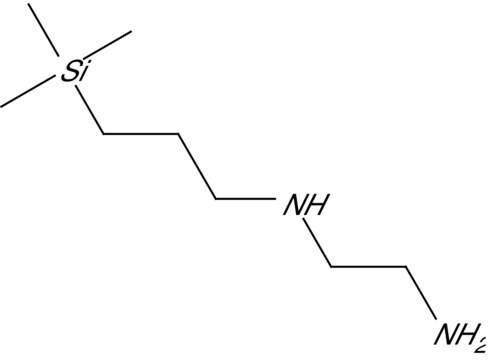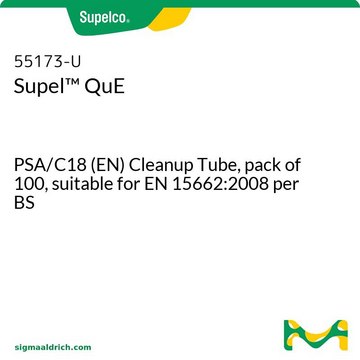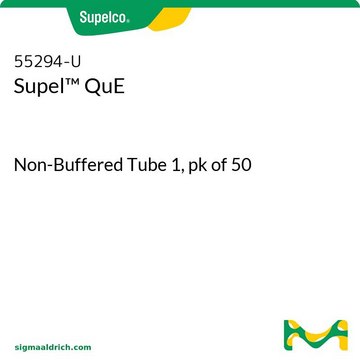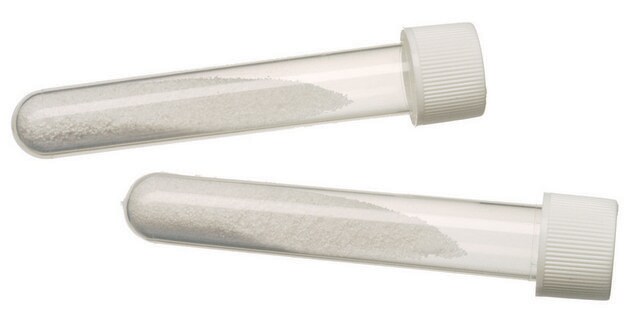추천 제품
product name
Supel™ QuE, PSA (EN) Cleanup Tube, pack of 100, suitable for EN 15662:2008 per BS
material
polypropylene tube
Quality Level
Agency
suitable for BS EN 15662:2008
제품 라인
Supel™
구성
magnesium sulfate, 150 mg
Supelclean™ PSA, 25 mg
포장
pack of 100
기술
QuEChERS: suitable
원심분리 튜브 용적
2 mL
기질 활성군
PSA phase
응용 분야
food and beverages
유사한 제품을 찾으십니까? 방문 제품 비교 안내
일반 설명
Dispersive SPE (dSPE), often referred to as the "QuEChERS" method (Quick, Easy, Cheap, Effective, Rugged, and Safe), is modern sample prep technique that is becoming increasingly popular in the area of multi-residue pesticide analysis in food and agricultural products.
Using the QuEChERS method, food/agricultural samples are first extracted with an aqueous miscible solvent (e.g., acetonitrile) in the presence of high amounts of salts (e.g., sodium chloride and magnesium sulfate) and/or buffering agents (e.g. citrate) to induce liquid phase separation and stabilize acid and base labile pesticides, respectively. Upon shaking and centrifugation, an aliquot of the organic phase is subjected to further cleanup using SPE. Unlike traditional methods using SPE tubes, in dispersive SPE, cleanup is facilitated by mixing bulk amounts of SPE (e.g., Supelclean PSA, ENVI-Carb, and/or Discovery DSC-18) with the extract. After sample cleanup, the mixture is centrifuged and the resulting supernatant can either be analyzed directly or can be subjected to minor further treatment before analysis.
Supelco carries a line of vials and centrifuge tubes containing pre-determined amounts of salts and SPE sorbents to support the most common method configurations used today.
Using the QuEChERS method, food/agricultural samples are first extracted with an aqueous miscible solvent (e.g., acetonitrile) in the presence of high amounts of salts (e.g., sodium chloride and magnesium sulfate) and/or buffering agents (e.g. citrate) to induce liquid phase separation and stabilize acid and base labile pesticides, respectively. Upon shaking and centrifugation, an aliquot of the organic phase is subjected to further cleanup using SPE. Unlike traditional methods using SPE tubes, in dispersive SPE, cleanup is facilitated by mixing bulk amounts of SPE (e.g., Supelclean PSA, ENVI-Carb, and/or Discovery DSC-18) with the extract. After sample cleanup, the mixture is centrifuged and the resulting supernatant can either be analyzed directly or can be subjected to minor further treatment before analysis.
Supelco carries a line of vials and centrifuge tubes containing pre-determined amounts of salts and SPE sorbents to support the most common method configurations used today.
법적 정보
Supel is a trademark of Sigma-Aldrich Co. LLC
Supelclean is a trademark of Sigma-Aldrich Co. LLC
적합한 제품을 찾을 수 없으신가요?
당사의 제품 선택기 도구.을(를) 시도해 보세요.
Storage Class Code
13 - Non Combustible Solids
WGK
WGK 1
이미 열람한 고객
Maria Teresa Salles Trevisan et al.
Journal of chromatography. A, 1512, 98-106 (2017-07-20)
An analytical method using a quick, easy, cheap, effective, rugged and safe (QuEChERS) procedure for multi-residue determination of 52 pesticides in coffee leaf extractshas been developed and validated according to SANTE/11945/2015 guidelines. Different sorbent combinations for dispersive solid phase extraction
David Moreno-González et al.
Talanta, 128, 299-304 (2014-07-26)
In this study a fast, selective and sensitive multiresidue method based on QuEChERS methodology has been evaluated and validated for the determination of carbamate pesticides, in edible vegetable oils by UHPLC-MS/MS. A new clean-up sorbent, Supel(TM) QuE Z-Sep(+), has been
Lijun Han et al.
Journal of separation science, 39(23), 4592-4602 (2016-11-03)
A novel carbon/zirconia-based material, Supel
자사의 과학자팀은 생명 과학, 재료 과학, 화학 합성, 크로마토그래피, 분석 및 기타 많은 영역을 포함한 모든 과학 분야에 경험이 있습니다..
고객지원팀으로 연락바랍니다.









